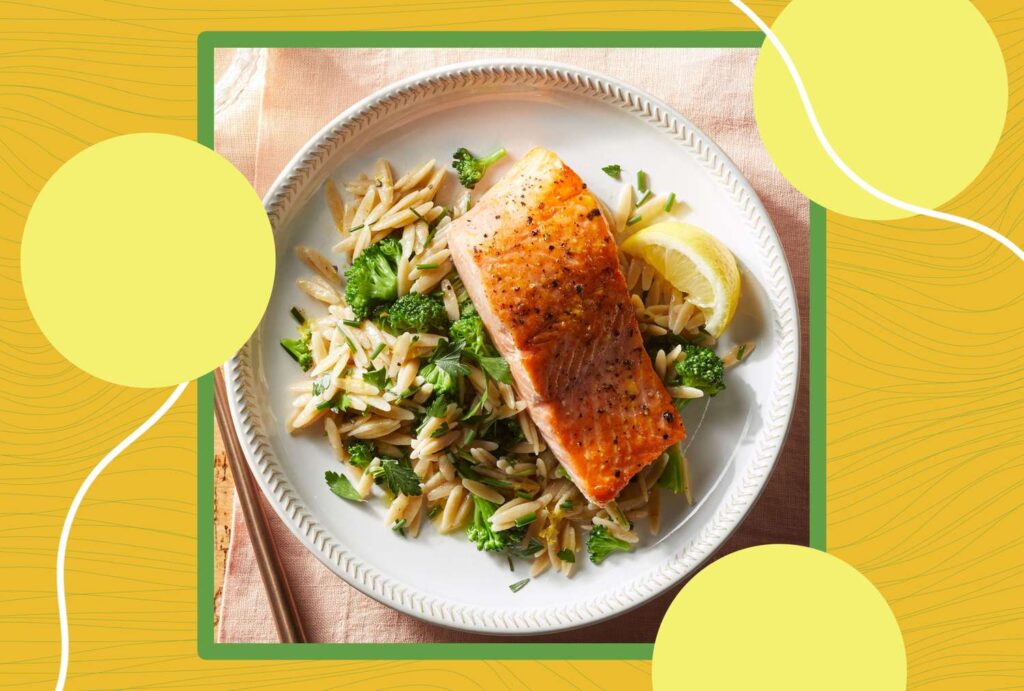- Our Salmon with Lemon-Herb Orzo & Broccoli recipe is a cardiologist’s top pick for a heart-healthy, anti-inflammatory dinner.
- Rich in omega-3s, protein, fiber and antioxidants, this dish can help keep you full and protect your heart.
- For a heart-healthy meal, choose fiber-rich plants, healthy fats and cooking methods like grilling and baking.
Chronic inflammation is linked to heart disease—and your diet can help keep it in check. “An anti-inflammatory diet supports heart health by lowering inflammatory markers,” says Randy Gould, M.D. This leads to improved blood vessel function and helps to prevent atherosclerosis, blood clots, heart attacks and strokes, he explains. Foods like fruits, veggies, whole grains, nuts, legumes, fatty fish, olive oil and herbs are central to an anti-inflammatory diet.
For a simple, heart-healthy dinner, Gould recommends our Salmon with Lemon-Herb Orzo & Broccoli. It meets our anti-inflammatory and heart-healthy nutrition guidelines, takes less than 30 minutes to prep and has a 4.8-star rating, making it a repeat dinner for many. In this article, Gould shares why he loves this dinner and provides tips for lowering inflammation and supporting heart health.
Why Salmon with Lemon-Herb Orzo & Broccoli Is the Best Anti-Inflammatory Dinner for Heart Health
Excellent Source of Omega-3 Fatty Acids
Without a doubt, omega-3 fatty acids are among the most important nutrients for reducing inflammation and supporting heart health. This dish features salmon, which is rich in omega-3s and one of the top reasons Gould recommends it: “Foods that are high in omega-3 fatty acids improve endothelial function and reduce oxidative stress.” The endothelium—the inner lining of your blood vessels—doesn’t work well when inflamed, which can contribute to heart issues like atherosclerosis (plaque buildup in your arteries) and high blood pressure.
“Additionally, [omega-3s] can help lower triglyceride levels and can increase HDL (“good”) cholesterol,” he adds. In fact, a large study found that a higher intake of omega-3 fatty acids is strongly associated with lower triglycerides and non-HDL (“bad”) cholesterol.
Plus, each serving provides 35 grams of high-quality protein, which is important for satiety and muscle health, and contains just 3 grams of cholesterol-raising saturated fat.
Rich in Fiber
Most people know that fiber is great for a healthy gut, but it’s also crucial for heart health. Each serving of this dinner has 8 grams of fiber—about 29% of the Daily Value. “The orzo is a good source of fiber, which helps lower LDL (“bad”) cholesterol. Broccoli also has a high fiber content, which helps to bind to LDL cholesterol and prevent its absorption, thus reducing LDL levels,” says Gould.
Excess LDL cholesterol in your blood can lead to plaque buildup in your arteries, which may stiffen over time and increase the risk of a heart attack. Getting enough fiber is crucial, and this dinner makes it easy to make a big dent in your fiber intake.
It Contains Heart-Supporting Antioxidants
This dish is packed with antioxidant-rich foods, such as salmon, broccoli, herbs and spices. Salmon provides omega-3 fatty acids and astaxanthin—the compound that gives salmon its pinkish-red color—which both have anti-inflammatory and antioxidant properties. Broccoli offers glucosinolates, sulphur compounds with strong anti-inflammatory effects, along with vitamins A, C and E, all of which are antioxidants.
“Herbs and spices are [also] excellent natural sources of antioxidants, which can prevent the body from unstable molecules called free radicals that cause oxidative stress and can lead to heart disease,” says Gould.
Research shows that higher antioxidant intake is linked with a lower risk of heart diseases, such as coronary heart disease, high blood pressure and atherosclerosis. Interestingly, these benefits are strongest when antioxidants are consumed through whole foods rather than supplements, giving you yet another reason to enjoy this dinner.
Tips for Supporting Heart Health
- Choose Baked or Grilled Foods over Fried. Research shows a clear link between high consumption of fried foods and coronary heart disease. Fried foods are generally high in trans fats and saturated fats, which can raise LDL (“bad”) cholesterol and lower HDL (“good”) cholesterol. Instead of frying, Gould recommends lower-fat cooking methods like baking or grilling.
- Prioritize Heart-Healthy Fats. Fats are still an important part of an anti-inflammatory diet, but the type of fat matters. “Healthy fats, such as olive oil, are a key component of anti-inflammatory diets,” says Gould. Other heart-healthy fat sources include fatty fish, nuts, seeds, avocados and their oils. Prioritize these over saturated fats found in foods like butter, fatty cuts of meat, cheese, cream-based sauces and baked goods.
- Eat Plenty of Fiber. Dietary guidelines recommend at least 25 grams of fiber per day for women and 38 grams per day for men, but less than 10% of Americans meet this recommendation. To meet your fiber needs, eat plenty of fiber-rich foods like fruits, vegetables, nuts, seeds, whole grains and legumes.
Our Expert Take
For a cardiologist-recommended dinner that comes together in under 30 minutes, try Salmon with Lemon-Herb Orzo & Broccoli. With whole-grain orzo, broccoli, salmon, olive oil and herbs, it provides a heart-healthy mix of omega-3s, fiber and antioxidants. Plus, it’s packed with protein to keep you full and satisfied for longer. When planning a healthy meal, Gould recommends prioritizing heart-healthy fats like olive oil, including fiber-rich plants and using lower-fat cooking methods instead of frying. Making these small changes to your diet can add up to big improvements in your heart health.

